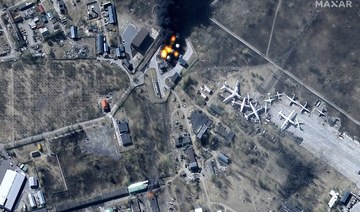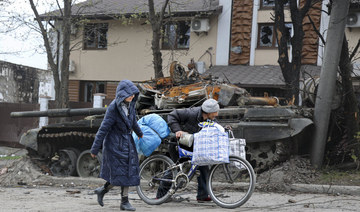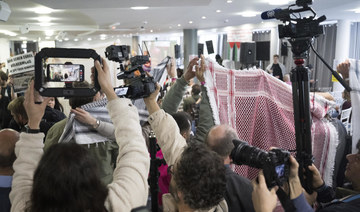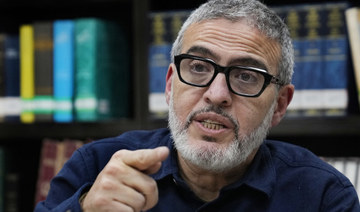ZAPORIZHZHIA: New satellite images show what appear to be mass graves near Mariupol, and local officials accused Russia of burying up to 9,000 Ukrainian civilians there in an effort to conceal the slaughter taking place in the siege of the port city.
The images emerged Thursday, just hours after Russian President Vladimir Putin claimed victory in the battle for Mariupol, despite the presence of an estimated 2,000 Ukrainian fighters who were still holed up at a giant steel mill. Putin ordered his troops to seal off the stronghold “so that not even a fly comes through” instead of storming it.
Satellite image provider Maxar Technologies released the photos, which it said showed more than 200 mass graves in a town where Ukrainian officials say the Russians have been burying Mariupol residents killed in the fighting. The imagery showed long rows of graves stretching away from an existing cemetery in the town of Manhush, outside Mariupol.
Mariupol Mayor Vadym Boychenko accused the Russians of “hiding their military crimes” by taking the bodies of civilians from the city and burying them in Manhush.
The graves could hold as many as 9,000 dead, the Mariupol City Council said Thursday in a post on the Telegram messaging app.
Boychenko labeled Russian actions in the city as “the new Babi Yar,” a reference to the site of multiple Nazi massacres in which nearly 34,000 Ukrainian Jews were killed in 1941.
“The bodies of the dead were being brought by the truckload and actually simply being dumped in mounds,” an aide to Boychenko, Piotr Andryushchenko, said on Telegram.
There was no immediate reaction from the Kremlin. When mass graves and hundreds of dead civilians were discovered in Bucha and other towns around Kyiv after Russian troops retreated three weeks ago, Russian officials denied that their soldiers killed any civilians there and accused Ukraine of staging the atrocities.
In a statement, Maxar said a review of previous images indicates that the graves in Manhush were dug in late March and expanded in recent weeks.
After nearly two lethal months of bombardment that largely reduced Mariupol to a smoking ruin, Russian forces appear to control the rest of the strategic southern city, including its vital but now badly damaged port.
But a few thousand Ukrainian troops, by Moscow’s estimate, have stubbornly held out for weeks at the steel plant, despite a pummeling from Russian forces and repeated demands for their surrender. About 1,000 civilians were also trapped there, according to Ukrainian officials.
Ukrainian officials have repeatedly accused Russia of launching attacks to block civilian evacuations from Mariupol.
At least two Russian attacks on Thursday hit the city of Zaporizhzhia, a way station for people fleeing Mariupol. No one was wounded, the regional governor said.
Among those who arrived in Zaporizhzhia after fleeing the city were Yuriy and Polina Lulac, who spent nearly two months living in a basement with at least a dozen other people. There was no running water and little food, Yuriy Lulac said.
“What was happening there was so horrible that you can’t describe it,” said the native Russian speaker who used a derogatory word for the Russian troops, saying they were “killing people for nothing.”
“Mariupol is gone. In the courtyards there are just graves and crosses,” Lulac said.
The Red Cross said it had expected to to evacuate 1,500 people by bus, but that the Russians allowed only a few dozen to leave and pulled some people off of the buses.
Dmitriy Antipenko said he lived mostly in a basement with his wife and father-in-law amid death and destruction.
“In the courtyard, there was a little cemetery, and we buried seven people there,” Antipenko said, wiping away tears.
Instead of sending troops to finish off the Mariupol defenders inside the steel factory in a potentially bloody frontal assault, Russia apparently intends to maintain the siege and wait for the fighters to surrender when they run out of food or ammunition.
All told, more than 100,000 people were believed trapped with little or no food, water, heat or medicine in Mariupol, which had a prewar population of about 430,000. Over 20,000 people have been killed in the siege, according to Ukrainian authorities.
The city has seized worldwide attention as the scene of some of the worst suffering of the war, including deadly airstrikes on a maternity hospital and a theater.
Boychenko rejected any notion that Mariupol had fallen into Russian hands.
“The city was, is and remains Ukrainian,” he declared. “Today our brave warriors, our heroes, are defending our city.”
The capture of Mariupol would represent the Kremlin’s biggest victory yet of the war in Ukraine. It would help Moscow secure more of the coastline, complete a land bridge between Russia and the Crimean Peninsula, which Russia seized in 2014, and free up more forces to join the larger and potentially more consequential battle now underway for Ukraine’s eastern industrial heartland, the Donbas.
At a joint appearance with Russian Defense Minister Sergei Shoigu, Putin declared, “The completion of combat work to liberate Mariupol is a success,” and he offered congratulations to Shoigu.
Shoigu predicted the Azovstal steel mill could be taken in three to four days. But Putin said that would be “pointless” and expressed concern for the lives of Russian troops in deciding against sending them in to clear out the sprawling plant, where the die-hard defenders were hiding in a maze of underground passageways.
Instead, the Russian leader said, the military should “block off this industrial area so that not even a fly comes through.”
The plant covers 11 square kilometers (4 square miles) and is threaded with some 24 kilometers (15 miles) of tunnels and bunkers.
“The Russian agenda now is not to capture these really difficult places where the Ukrainians can hold out in the urban centers, but to try and capture territory and also to encircle the Ukrainian forces and declare a huge victory,” retired British Rear Adm. Chris Parry said.
Russian officials for weeks have said capturing the mostly Russian-speaking Donbas is the war’s main objective. Moscow’s forces opened the new phase of the fighting this week along a 300-mile (480-kilometer) front from the northeastern city of Kharkiv to the Azov Sea.
While Russia continued heavy air and artillery attacks in those areas, it did not appear to gain any significant ground over the past few days, according to military analysts, who said Moscow’s forces were still ramping up the offensive.
A senior US defense official, speaking on condition of anonymity to discuss the Pentagon’s assessment, said the Ukrainians were hindering the Russian effort to push south from Izyum.
Rockets struck a neighborhood of Kharkiv on Thursday, and at least two civilians were burned to death in their car. A school and a residential building were also hit, and firefighters tried to put out a blaze and search for anyone trapped.
Elsewhere, Ukrainian Deputy Prime Minister Iryna Vereshchuk said Russian troops kidnapped a local official heading up a humanitarian convoy in the southern Kherson region. She said the Russians offered to free him in exchange for Russian prisoners of war, but she characterized that as unacceptable.
Vereshchuk also said efforts to establish three humanitarian corridors in the Kherson region failed Thursday because Russian troops did not hold their fire.
In the US, President Joe Biden pledged an additional $1.3 billion for new weapons and economic assistance to help Ukraine, and he promised to seek much more from Congress to keep the guns, ammunition and cash flowing.
Possible mass graves near Mariupol shown in satellite images
https://arab.news/2ksvp
Possible mass graves near Mariupol shown in satellite images
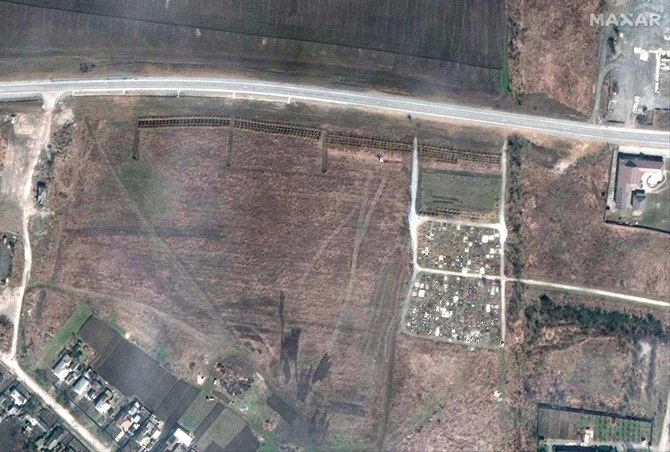
- Mariupol Mayor Vadym Boychenko accused the Russians of “hiding their military crimes” by taking the bodies of civilians from the city and burying them in Manhush
- The graves could hold as many as 9,000 dead, said the Mariupol City Council
Netherlands remembers World War Two dead amid tight security due to Gaza war
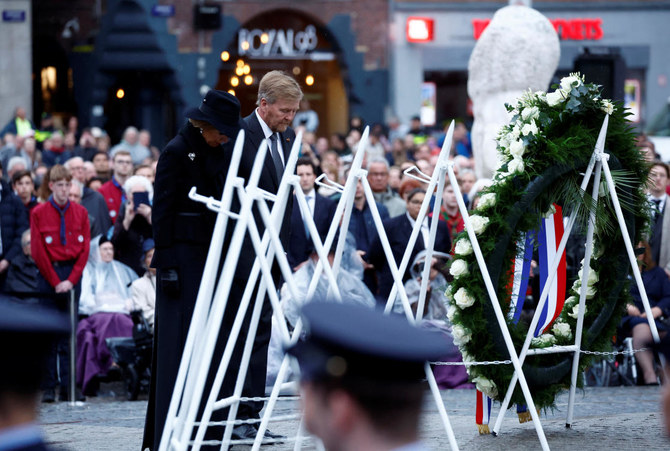
Earlier this week municipal authorities announced unprecedented security measures to keep the ceremony safe and avoid possible disruptions linked to the Israel-Hamas war
AMSTERDAM: Dutch King Willem-Alexander and Prime Minister Mark Rutte joined around 4,000 people on Saturday for the country’s annual World War Two remembrance ceremony amid restricted public access and heightened security due to the war in Gaza.
The ceremony on Amsterdam’s central Dam square, with the traditional two minutes of silence at 8 p.m. (1800 GMT) to commemorate the victims of World War Two, passed smoothly despite fears that there might be protests.
Normally some 20,000 people attend the Dam commemoration without having to register. But earlier this week municipal authorities announced unprecedented security measures to keep the ceremony safe and avoid possible disruptions linked to the Israel-Hamas war.
At the opening of a Holocaust Museum in Amsterdam in March, pro-Palestinian protesters opposed to Israel’s military campaign in Gaza set off fireworks and booed Israeli President Isaac Herzog as he arrived on a visit.
Every town and the city in the Netherlands holds its own remembrance ceremony on May 4 and tens of thousands of people attend the events. The Netherlands then marks on May 5 the anniversary of its liberation from Nazi occupation in 1945.
Drone footage shows Ukrainian village battered to ruins as residents flee Russian advance
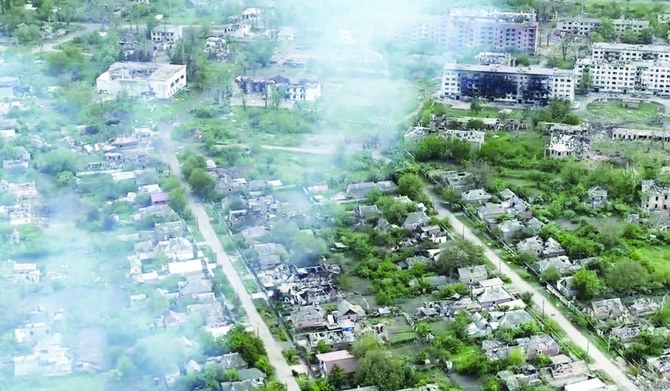
- Residents have scrambled to flee the village, among them a 98-year-old woman who walked almost 10 kilometers (6 miles) alone last week, wearing a pair of slippers and supported by a cane, until she reached Ukrainian front lines
KYIV: The Ukrainian village of Ocheretyne has been battered by fighting, drone footage obtained by The Associated Press shows. The village has been a target for Russian forces in the Donetsk region of eastern Ukraine.
Russian troops have been advancing in the area, pounding Kyiv’s depleted, ammunition-deprived forces with artillery, drones and bombs. Ukraine’s military has acknowledged the Russians have gained a “foothold” in Ocheretyne, which had a population of about 3,000 before the war, but says that fighting continues.
Residents have scrambled to flee the village, among them a 98-year-old woman who walked almost 10 kilometers (6 miles) alone last week, wearing a pair of slippers and supported by a cane, until she reached Ukrainian front lines.
FASTFACT
Ukraine’s military has acknowledged the Russians have gained a “foothold” in Ocheretyne, which had a population of about 3,000 before the war, but says that fighting continues.
Not a single person is seen in the footage, and no building in Ocheretyne appears to have been left untouched by the fighting. Most houses, apartment blocks and other buildings look damaged beyond repair, and many houses have been pummeled into piles of wood and bricks. A factory on the outskirts has also been badly damaged.
The footage also shows smoke billowing from several houses, and fires burning in at least two buildings.
Elsewhere, Russia has in recent weeks stepped up attacks on Kharkiv, Ukraine’s second-largest city, in an attempt to pummel the region’s energy infrastructure and terrorize its 1.3 million residents.
Four people were wounded and a two-story civilian building was damaged and set ablaze overnight after Russian forces struck Kharkiv, in northeastern Ukraine, with exploding drones, regional governor Oleh Syniehubov said Saturday.
The four, including a 13-year-old, were hurt by falling debris, he said on the Telegram messaging app.
Russian state agency RIA reported Saturday reported that Moscow’s forces struck a drone warehouse in Kharkiv that had been used by Ukrainian troops overnight, citing Sergei Lebedev, described as a coordinator of local pro-Moscow guerrillas. His comments could not be independently verified.
Syniehubov said Russia also bombed Kharkiv on Friday, damaging residential buildings and sparking a fire. An 82-year-old woman died and two men were wounded.
Ukraine’s military said Russia launched a total of 13 Shahed drones at the Kharkiv and Dnipropetrovsk regions of eastern Ukraine overnight, all of which were shot down by Ukrainian air defenses.
Sadiq Khan, Pakistani immigrant bus driver’s son, makes history by winning third term as London mayor
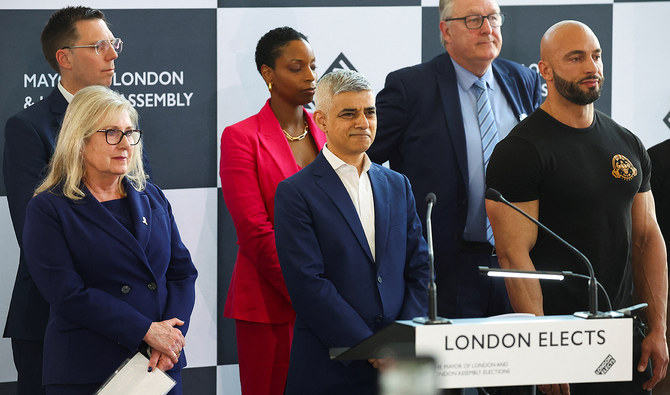
- Khan, an official with global renown, became the first Muslim mayor of a Western capital when elected in 2016
- Born in London in 1970, he grew up in public housing the Tooting area and slept in a bunk-bed until he was 24
LONDON: Sadiq Khan, who was Saturday re-elected for a record third term as London mayor, rose from humble roots to spar with world leaders and bring consequential change to the British capital.
The 53-year-old Labor party politician – a former human rights lawyer brought up on a London public housing complex – comfortably defeated Conservative rival Susan Hall for a third stint at City Hall.
He now overtakes predecessor Boris Johnson as the longest-serving holder of the post, which notably has powers over the emergency services, transport and planning in the city of nearly nine million.
Victory continues a remarkable journey for the Pakistani immigrant bus driver’s son, who became the first Muslim mayor of a Western capital when initially elected in 2016.
As mayor, he has made a name for himself as a vocal critic of Brexit and successive Conservative prime ministers, including Johnson, as well as for a feud with former US president Donald Trump.
The pair became embroiled in an extraordinary war of words after Khan criticized Trump’s travel ban on people from certain Muslim countries.
Trump then accused Khan of doing a “very bad job on terrorism” and called him a “stone cold loser” and a “national disgrace.”
The mayor in turn allowed an infamous blimp of Trump dressed as a baby in a nappy to fly above protests in Parliament Square during his 2018 visit to Britain.
“He once called me a stone cold loser. Only one of us is a loser, and it’s not me,” Khan told AFP during his 2021 campaign.
But Khan’s own tenure has not been without its controversies, particularly over last year’s expansion of an Ultra-Low Emission Zone into the largest pollution-charging scheme in the world.
The daily toll on the most-polluting vehicles prompted a fierce backlash in outer boroughs of Greater London, with anger at the extra financial burden during a cost-of-living crisis.
Khan has also been criticized for failing to get to grips with high levels of knife crime and since last year, his handling of large weekly pro-Palestinian protests.
Born in London in 1970 to parents who had recently arrived from Pakistan, Khan was the fifth child out of seven brothers and one sister.
He grew up in public housing in Tooting, an ethnically mixed residential area in south London, and slept in a bunk-bed until he was 24.
His modest background plays well in a city that is proud of its diversity and loves a self-made success story.
Khan still regularly recalls how his father drove one of London’s famous red buses, and his mother was a seamstress.
He is a handy boxer, having learnt the sport to defend himself in the streets against those who hurled racist abuse at him, and two of his brothers are boxing coaches.
He initially wanted to become a dentist, but a teacher spotted his gift for verbal sparring and directed him toward law.
He gained a law degree from the University of North London and started out as a trainee lawyer in 1994 at the Christian Fisher legal firm, where he was eventually made a partner.
He specialized in human rights, and spent three years chairing the civil liberties campaign group Liberty.
He represented Louis Farrakhan, leader of the Nation of Islam movement, and Babar Ahmad, a mosque acquaintance who was jailed in the United States after admitting providing support to the Taliban regime in Afghanistan.
Khan joined Labor aged 15 when Conservative prime minister Margaret Thatcher was in her pomp.
He became a local councilor for Tooting in the Conservative-dominated Wandsworth local borough in 1994, and its member of parliament in 2005.
He still lives in the area with his lawyer wife Saadiya and their two teenage daughters.
Labor prime minister Gordon Brown made him communities minister in 2008 and he later served as transport minister, becoming the first Muslim minister to attend Cabinet meetings.
In parliament, he voted for gay marriage – which earned him death threats.
As mayor, he vowed to focus on providing affordable homes for Londoners and freezing transport fares, but – like many in power around the world – saw his agenda engulfed by the pandemic.
He is London’s third mayor after Labor’s Ken Livingstone (2000-2008) and Johnson (2008-2016), with widespread speculation he could eventually try to follow in his predecessor and become prime minister.
London mayor Khan wins historic third term as Tories routed in local polls

- Khan, 53, easily beat Tory challenger Susan Hall to scupper largely forlorn Tory hopes that they could prise the UK capital away from Labour for the first time since 2016
- In the West Midlands, where Tory incumbent Andy Street is bidding for his own third term, votes were reportedly being recounted and too close to call
LONDON: London’s Labour mayor Sadiq Khan on Saturday secured a record third term, dealing the Conservatives another damaging defeat in their worst local election results in recent memory months before an expected general election.
Khan, 53, easily beat Tory challenger Susan Hall to scupper largely forlorn Tory hopes that they could prise the UK capital away from Labour for the first time since 2016.
The first Muslim mayor of a Western capital when first elected then, he had been widely expected to win as Labour surge nationally and the Conservatives suffer in the polls.
In the end, he saw his margin of victory increase compared to the last contest in 2021.
It adds to a dismal set of results for Prime Minister Rishi Sunak, as his Tories finished a humiliating third in local council tallies after losing nearly 500 seats in voting Thursday across England.
With Labour making huge gains, the beleaguered leader’s Conservatives lost crunch mayoral races in Manchester, Liverpool, Yorkshire as well as the capital and elsewhere.
In the West Midlands, where Tory incumbent Andy Street is bidding for his own third term, votes were reportedly being recounted and too close to call.
An unexpected Tory defeat there could leave Sunak with only one notable success: its mayor winning a third term in Tees Valley, northeast England — albeit with a vastly reduced majority.
Writing in Saturday’s Daily Telegraph, Sunak conceded “voters are frustrated” but insisted “Labour is not winning in places they admit they need for a majority.”
“We Conservatives have everything to fight for,” Sunak argued.
Labour, out of power since 2010 and trounced by Boris Johnson’s Conservatives at the last general election in 2019, also emphatically snatched a parliamentary seat from the Conservatives.
It seized on winning the Blackpool South constituency and other successes to demand a national vote.
“Let’s turn the page on decline and usher in national renewal with Labour,” party leader Keir Starmer told supporters Saturday in the East Midlands, where the party won the mayoral race.
Sunak must order a general election be held by January 28 next year at the latest, and has said he is planning on a poll in the second half of 2024.
Labour has enjoyed double-digit poll leads for all of Sunak’s 18 months in charge, as previous Tory scandals, a cost-of-living crisis and various other issues dent the ruling party’s standing.
On Thursday, they were defending nearly 1,000 council seats, many secured in 2021 when they led nationwide polls before the implosion of Johnson’s premiership and his successor Liz Truss’s disastrous 49-day tenure.
With almost all those results in by Saturday afternoon, they had lost close to half and finished third behind the smaller centrist opposition Liberal Democrats.
If replicated in a nationwide contest, the tallies suggested Labour would win 34 percent of the vote, with the Tories trailing by nine points, according to the BBC.
Sky News’ projection for a general election using the results predicted Labour will be the largest party but short of an overall majority.
Its by-election scalp in Blackpool — on a mammoth 26-percent swing — was the Conservatives’ 11th such loss in this parliament, the most by any government since the late 1960s.
Speculation has been rife in Westminster that restive Tory lawmakers could use the dire local election results to try to replace him. But that prospect seems to have failed to materialize.
However, it was not all good news for Labour.
The party lost control of one local authority, and suffered some councillor losses to independents elsewhere, due to what analysts said was its stance on the Israel-Hamas war.
Polling expert John Curtice assessed there were concerning signs for the opposition.
“These were more elections in which the impetus to defeat the Conservatives was greater than the level of enthusiasm for Labour,” he noted in the i newspaper.
“Electorally, it is still far from clear that Sir Keir Starmer is the heir to (Tony) Blair.”
A British-Palestinian doctor was denied entry to France for a Senate meeting about the war in Gaza
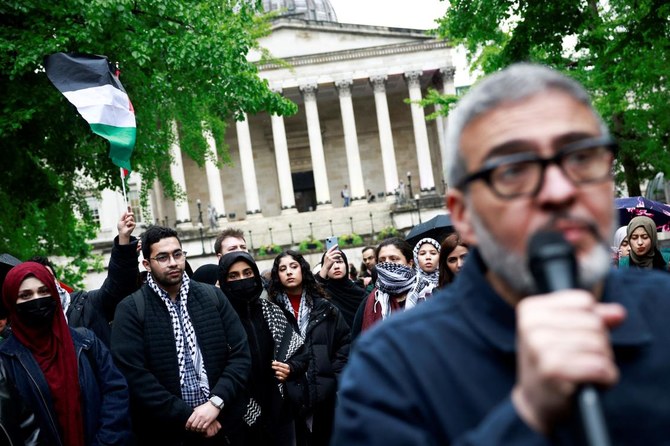
- Dr. Ghassan Abu Sitta was placed in a holding zone in the Charles de Gaulle airport and will be expelled, according to French Sen. Raymonde Poncet Monge
- Abu Sitta posted on social networks that he was denied entry in France because of a one-year ban by Germany on his entry to Europe
PARIS: A well-known British-Palestinian surgeon who volunteered in Gaza hospitals said he was denied entry to France on Saturday to speak at a French Senate meeting about the Israel-Hamas war. Authorities wouldn’t give a reason for the decision.
Dr. Ghassan Abu Sitta was placed in a holding zone in the Charles de Gaulle airport and will be expelled, according to French Sen. Raymonde Poncet Monge, who had invited him to speak at the Senate.
‘’It’s a disgrace,’’ she posted on X.
Abu Sitta posted on social networks that he was denied entry in France because of a one-year ban by Germany on his entry to Europe. Germany denied him entry last month, and France and Germany are part of Europe’s border-free Schengen zone. He posted Saturday that he was being sent back to London.
The French Foreign Ministry, Interior Ministry, local police and the Paris airport authority would not comment on what happened or give an explanation.
Abu Sitta had been invited by France’s left-wing Ecologists group in the Senate to speak at a colloquium Saturday about the situation in Gaza, according to the Senate press service. The gathering included testimony from medics, journalists and international legal experts with Gaza-related experience.
Last month Abu Sitta was denied entry to Germany to take part in a pro-Palestinian conference. He said he was stopped at passport control, held for several hours and then told he had to return to the UK He said airport police told him he was refused entry due to “the safety of the people at the conference and public order.”
Abu Sitta, who recently volunteered with Doctors Without Borders in Gaza, has worked during multiple conflicts in the Palestinian territories, beginning in the late 1980s during the first Palestinian uprising. He has also worked in other conflict zones, including in Iraq, Syria and Yemen.
France has seen tensions related to the Mideast conflict almost daily since the deadly Oct. 7 Hamas incursion into Israel. In recent days and weeks police have cleared out students at French campuses holding demonstrations and sit-ins similar to those in the United States.



